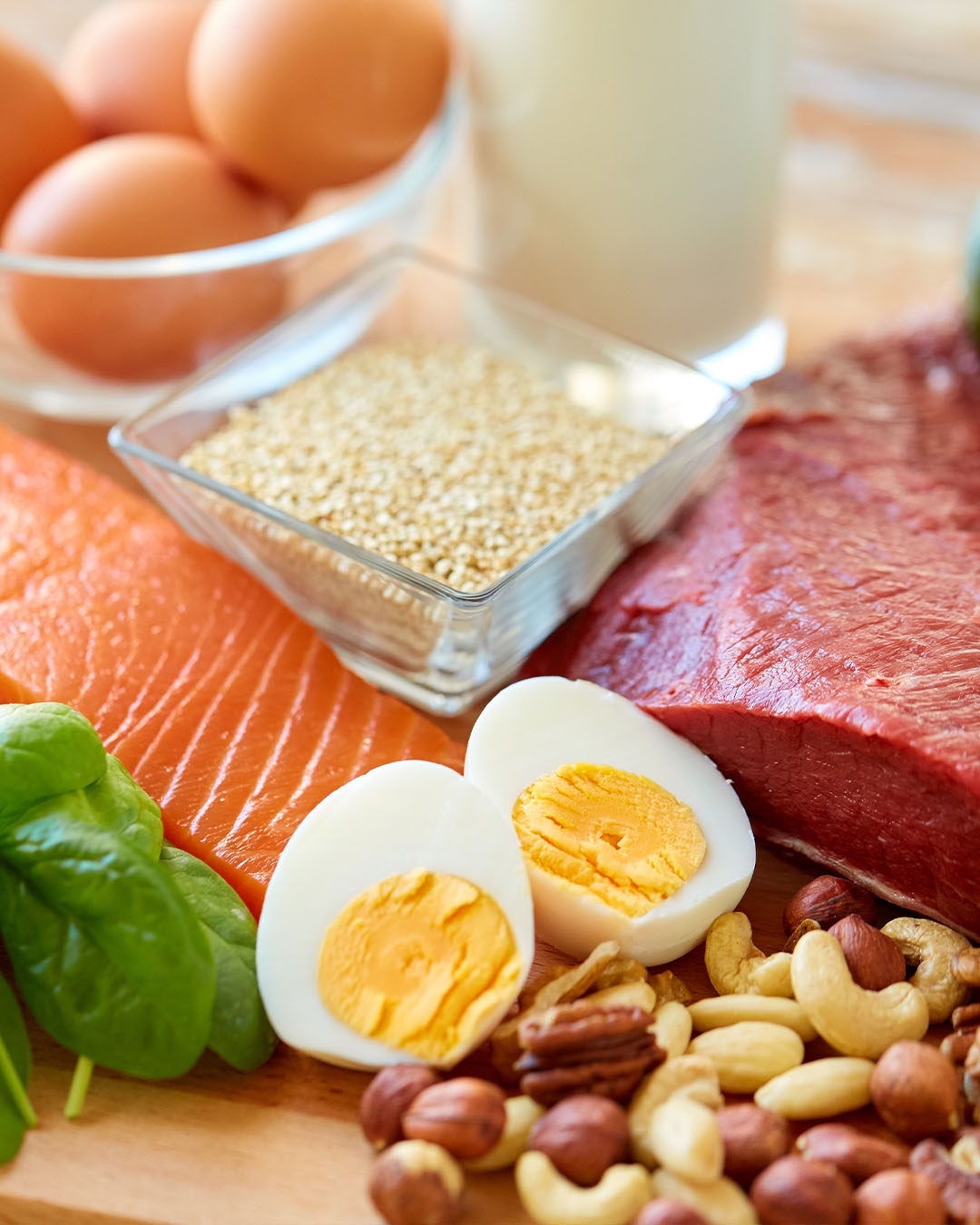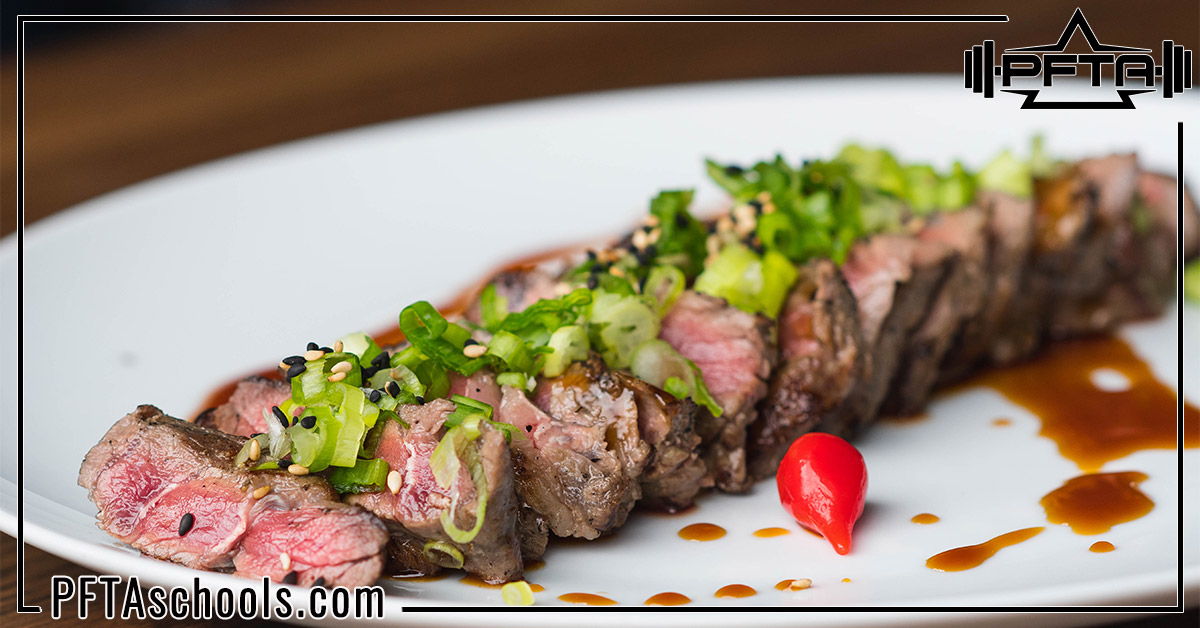Glutamine...
...is the most abundant amino acid swirling around in your blood plasma and muscle cells. Glutamine has been proven to assist with protein synthesis, which means that your muscles will get bigger and stronger when you include glutamine in your diet and exercise plan. Glutamine can also improve your immune system. Keep reading to learn more about this very important amino acid.
Protein
I'd be remiss if I didn't start by writing about protein. You can't get stronger, you can't reach your health potential, without including protein in your diet. Which kind of protein you include in your diet is up to you, but it's VERY necessary. Not sure how much you need, click this link to get a good estimate on How Much Protein your body requires. Or you can click the image below to learn an easy way to estimate your macros.

Amino Acids
Amino acids are the building blocks of protein. There are about 20 amino acids in our body and 9 of these amino acids are essential. This means you need to foods with these 9 essential amino acids because your body can NOT synthesize them. Fortunately for us, our bodies can make glutamine; but, we still need to eat enough protein to make sure your body has the right amount of amino acids to make enough glutamine.
Need help with a nutrition plan or an exercise plan? Click the image below to contact a PFTA certified personal trainer.

Immune System
We all need a stronger immune system. Getting enough glutamine may help build a stronger immune system and may help you fight upper respiratory infections. A review by Castell (2001) showed that athletes who supplemented with glutamine showed lower incidences of upper respiratory tract infections. The evidence is pretty clear that glutamine helps recovery from intensive exercise. Want more tips on building a stronger immune system? Click this link for more tips on Creating a Stronger Immune System.

How Much Glutamine?
In order to increase muscle and decrease bouts of illness, experts believe you should consume at least 3 grams of glutamine per day. Moreover, several studies have shown that glutamine depletion may occur after a strenuous workout; therefore, many sports nutritionists believe that glutamine should be part of your post-workout meal. Also, don't forget to rest between workouts so your body will recovery properly. Not sure how much rest you should be getting? Click this link to read more about Rest Days Between Workouts.

Types of Food
If you like beef, chicken, and fish, the great news is that each of those contain 2 to 4 grams of glutamine per serving. Stoppani (2009) also likes wheat germ and spinach as two of his favorite glutamine rich foods. Other foods that have a good amount of glutamine are white rice, corn, eggs, and tofu. Speaking of eggs, click this link to read more about the Power of Egg Protein. I usually put a scoop of protein powder in my smoothies, and most protein powders, usually have 2 to 4 grams of glutamine.

HGH Levels
Glutamine will also help preserve your muscle mass. As you age, especially 40 years plus, your body starts to lose muscle and stops producing as much human growth hormone. A review by Scipione (2006) showed that glutamine can actually increase your HGH levels. This is great news! That means with an exercise plan, and a proper diet which includes glutamine, you should be able to improve your HGH levels and increase or maintain your muscle mass.
Want to learn more about exercise science and sports nutrition? Click the image below to learn more about our classes.

Knowledge is Power
And if you want more tips on exercise and nutrition, add your email below. You'll receive weekly tips directly to your inbox. Plus, you'll also receive the occasional coupon code for our classes.
Summary
The science is very clear, we need protein, including glutamine in our diet. Glutamine will not only help with building muscle and strength, glutamine will also help you ward off illness, especially upper respiratory tract infections. You can get your daily dose of glutamine in foods such as beef, chicken, and fish; or you can buy glutamine supplements from your favorite nutrition store. Further research shows that exercise may deplete your glutamine so make sure you include some glutamine in your post-workout smoothie. If you need help designing a nutrition plan, please contact a PFTA certified personal trainer. Happy health and happy training!
Written By
RAEscobar, PFTA instructor and personal trainer
Sources:
Arwert, L. I., et al. “Effects of an Oral Mixture Containing Glycine, Glutamine and Niacin on Memory, GH and IGF-I Secretion in Middle-Aged and Elderly Subjects.” Nutritional Neuroscience, vol. 6, no. 5, Oct. 2003, pp. 269–275.
Castell, L. M., and E. A. Newsholme. “The Relation between Glutamine and the Immunodepression Observed in Exercise.” Amino Acids, vol. 20, no. 1, 2001, pp. 49–61.
Scipione, Armond. “GLUTAMINE: This Amino Acid Helps to Preserve Muscle Mass While Bolstering Immune and Gastrointestinal Health.” Life Extension, vol. 12, no. 1, Jan. 2006, pp. 87–90.
Stoppani, Jim. “15 Power Foods.” Flex, vol. 27, no. 3, May 2009, pp. 234–242.
Welbourne, T. C. “Increased Plasma Bicarbonate and Growth Hormone after an Oral Glutamine Load.” The American Journal of Clinical Nutrition, vol. 61, no. 5, May 1995, pp. 1058–1061.